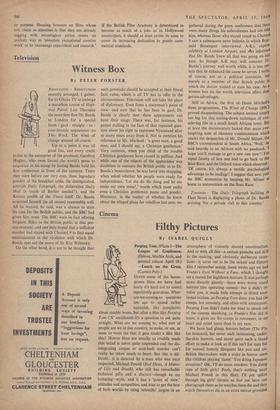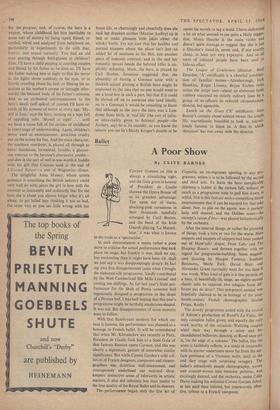Cinema
Filthy Pictures
By ISABEL QUIGLY Peeping Tom. (Plaza.)—The League of Gentlemen. (Odeon, Marble Arch, and general release April 18.) —Lunch on the Grass. (Cameo-Poly.) GIVEN some of the home- grown films we have had lately it's hard not to sound repetitively querulous. What- are-we-coming-to questions are apt to sound rather nannyish, like complaints about muddy boots, but after a film like Peeping Tom ('X' certificate) it's a question to ask quite straight. What are we coming to, what sort of people are we in this country, to make, or see, or seem to want (so that it gets made) a film like this? Horror films are usually so crudely made that belief is never quite suspended and the dis- integrating corpse or acid-bath murder can't really be taken much to heart. But this is dif- ferent: it is directed by a man who was once respected, Michael Powell (Red Shoes, A Matter of Life and Death), who still has remarkable technical gifts and a distinct—though to me Irritating—style; and it has a 'point of view,' attitudes and sympathies, and tries to get the best of both worlds by using 'scientific' jargon in an atmosphere of violently slanted emotionalism. And so with all this—a certain panache and skill in the making, and obviously deliberate inten- tions—it turns out to be the sickest and filthiest film I remember seeing. Some weeks ago we had Franju's Eyes Without a Face, which I thought set a record for highbrow horrors. It was perhaPs more directly ghastly—there were worse visual horrors (the operating scenes)—but it didn't in- volve you, it made little attempt at direct emo- tional realism, as Peeping Tom does; you had the creeps, but remotely, and often with amusement. Peeping Tom didn't make me want to streak out of the cinema shrieking, as Franju's film did at times; it gives me the creeps in retrospect, in rnY heart and mind more than in my eyes.
We have had glossy horrors before (The Fly, for instance), but never such insinuating, under- the-skin horrors, and never quite such a bland effort to make it look as if this isn't for nuts but for normal homely filmgoers like you and me. British film-makers with a stake in horror seem like children playing 'dares.' You doing Japanese atrocities? OK, I'll do mass murders. You doing rape of little girls? Pooh, that's nothing (says Michael Powell in this film), I'll put spikes through big girls' throats so that our hero can photograph them as he watches them die and they watch themselves die in an extra mirror provided
for the purpose; and, of course, the hero is a voyeur, whose childhood led him inevitably to some sort of fluttery by being taped, filmed, re- corded, wired and analysed from babyhood on, particularly in experiments to do with fear, horror, and sexual curiosity. You had an old man peering through field-glasses at children? Fine, I'll have a child peeping at courting couples and filmed by his father as he does so. I'll have the father waking him at night to film his terror at the lights shone suddenly in his eyes, or at lizards crawling about his bed; or filming his re- actions to his mother's corpse or (straight after- wards) the bikinied body of his father's mistress. And as an orchestral accompaniment to the hero's death (self-spiked, of course) Ill have re- cords of his screams of terror at every age. 'My- self at four,' says the hero, turning on a tape full of appalling yells. 'Myself at eight' . . . until we have a room full of the shrieks of childhood at every stage of understanding. Again, children's terror used as entertainment, atrocious cruelty put on the screen for fun. And the main character, the madman murderer, is played all through as hero—handsome, tormented, lovable, a glamor- ous contrast to the heroine's alternative youths— and dies in the sort of well-it-was-worth-it huddle with his girl that Cocteau used at the end of L'Eternel Retour—a sort of Wagnerian climax.
The delightful Anna Massey, whose screen presence is something the British industry could very well do with, plays the girl in love with the monster so innocently and ordinarily that for the time she is about you almost forget what it's all about, or get lulled into thinking it not so bad, the same way as you sec little wrong with her home life, so charmingly and cheerfully does she tuck her drunken mother (Maxine Audley) up in bed or make pleasant little jokes about the whisky bottle. I'm not sure that her healthy and normal niceness about the place isn't just an added bit of nastiness in the film, just another piece of indecent contrast; and in the end her romantic sprawl beside the beloved killer is im- plicitly sickening. Mark, the hero, is played by Carl Boehm. Someone suggested that the absurdity of having a German actor with a thickish accent playing a British hero might be explained by the idea that no one would want to see a local boy in such a part, but that if it could be shoved off on to someone else (and ideally, on to a German) it would be consoling to know that although in the story the hero was a Lon- doner from birth, in 'real life' (the sort of infra- or ultra-reality given to fictional people—the Archers, say) he is in outsider, as you know the minute you see he's Hardy Kruger's double or he
opens his mouth to say a word. I have elaborated a bit on what seemed to me quite a likely sugges- tion. Moira Shearer is the main victim and doesn't quite manage to suggest that she is just a film-star's stand-in, sweet and, if not exactlY cheap, at least not very expensive. And so all sorts of talented people have been used to hideous effect.
The League of Gentlemen (director : Basil Dearden; 'A' certificate) is a cheerfulcombina- tion of familiar names—Attenborough, Jack Hawkins, Roger Livesey, Bryan Forbes (wh° writes the script too)—about an elaborate bank robbery executed on strictly military lines by a group of ex-officers in reduced circumstances. Slowish, but agreeable.
Lunch on the Grass ('X' certificate); Jean Renoir's comedy about science versus the simple life, marvelously beautiful to look at, marvel- lously fatuous to listen to. A film in which 'direction' has run away with the director.



































 Previous page
Previous page